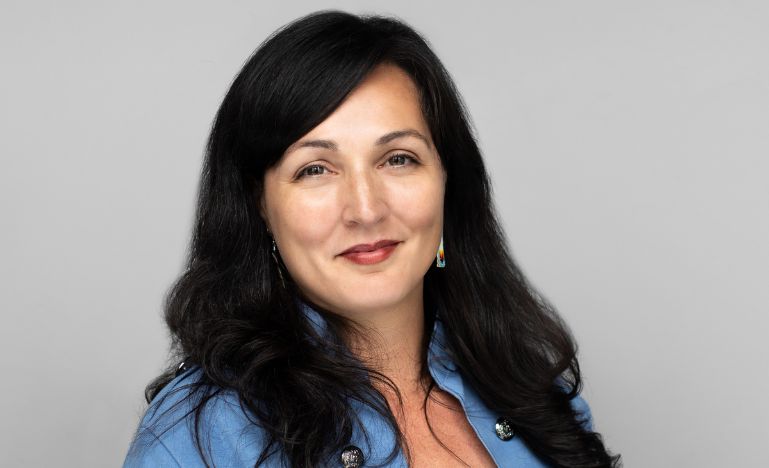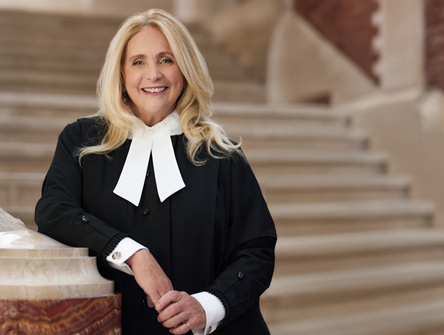Academic, advocate and author
CBA award winner Naiomi Metallic works to convey in accessible ways how the law can improve the lives of Indigenous people in Canada

When the Harper government moved 13 years ago to slash welfare rates for some of Canada’s most vulnerable citizens, it may not have expected a fight.
It got one.
Naiomi Metallic, winner of this year’s Ramon John Hnatyshyn Award for Law, helped First Nations in the Maritimes fend off those arbitrary and punishing cuts. The dispute known as Simon v. Canada became a legal odyssey from 2011 to 2015.
Metallic was still cutting her teeth as a litigator when the case landed at Burchells LLP, now Burchell Wickwire Bryson (BWB) LLP in Halifax, renowned for its ground-breaking Aboriginal law practice group.
“It totally opened my eyes to the problems and issues and the chronic underfunding of services in First Nations communities,” she says.
“It was something I never learned about, and there was virtually nothing written about it. I thought: ‘I need to write about this. I need to talk about this. I need to get this on people’s radar.’”
The new Liberal government in Ottawa dropped the welfare cut fight in 2015, “so we were able to prevent that and have been working with the government ever since,” says Metallic, who is from the Listuguj Mi’gmaq First Nation in Quebec.
But the case impressed on her a gaping lack of laws when it comes to First Nations services.
“Everything’s done by policy and funding agreements. They’re super dysfunctional and give the government a ton of discretion to interpret things in different ways, and do things that are problematic,” she says.
“I just noticed: ‘Wow. This is a massive problem in so many areas that’s affecting the poorest, most vulnerable people.’ It opened my eyes to the need for scholarship and academia.”
Metallic now divides her time between practice and teaching at the Dalhousie University’s Schulich School of Law where she holds the Chancellor’s Chair in Aboriginal Law and Policy.
Her focus as a legal scholar is to convey in accessible ways how the law can improve the lives of Indigenous people in Canada. She also studies the Mi’gmaq language and stories as part of her efforts to revitalize Indigenous legal orders.
Metallic’s 2019 paper, Making the most out of Canada’s new Department of Indigenous Services Act, for the Yellowhead Institute at Toronto Metropolitan University, described the major challenge of Simon v. Canada.
“Where there are no clear limits set out in law, courts are generally hesitant to impose strict rules on governments, especially when spending is involved.”
Also in 2019, she co-authored The Promise and Pitfalls of C-92: An Act respecting First Nations, Inuit, and Metis Children, Youth and Families, another paper published by Yellowhead.
When the Quebec government’s constitutional challenge of C-92, An Act Respecting First Nations, Métis and Inuit Children Youth and Families, reached the Supreme Court of Canada, Metallic was asked to join the legal team that intervened on behalf of the First Nations Child and Family Caring Society led by Cindy Blackstock, a longtime advocate for child welfare and Indigenous children’s rights.
In February, the high court unanimously upheld the Act, affirming First Nations, Inuit and Metis jurisdiction over the protection and welfare of their children.
Not only was Metallic an advocate and lawyer in the case, but her academic writings were cited by the Supreme Court, says BWB colleague Jason Cooke, KC. He was in the same law school section with Metallic at Dalhousie and nominated her for the Hnatyshyn award.
“I think that’s a very rare combination,” he says. “We obviously have academics who do great research, we have practitioners who are very effective advocates, and we have members who really make a difference in their communities. But it’s pretty extraordinary to be able to do all three, and at the highest level of excellence.”
Metallic’s influence as a revered, warm and approachable law professor is perhaps one of her greatest contributions, Cooke adds.
“She’s as good a teacher as there is out there, and it’s impacting the lawyers of tomorrow — and now, many of them, the lawyers of today — in really profound ways. That impact will go on for decades and decades.”
Metallic, 43, is clearly touched by such accolades, and said she encourages students to consider the power of scholarship.
“There are lots of areas that are completely underserved.”


